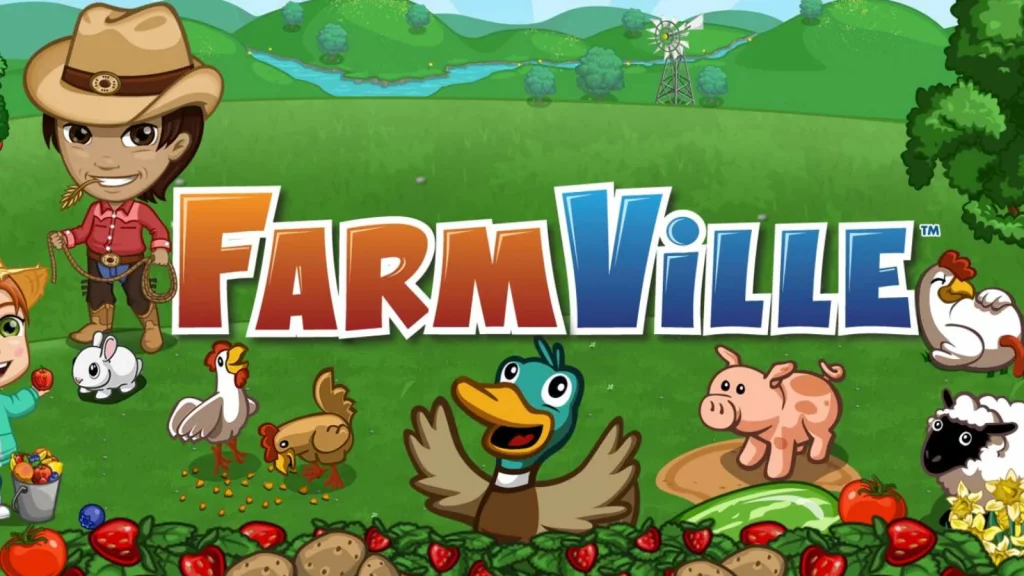Hey, my beloved website readers- another guest post for the site! I am not going to lie to you – I really wanted to write my own post over Christmas, but I was too busy getting fat thanks to my mum’s excellent Christmas cooking… mmm, turkey and ham and rocky road and white Christmas… anyway a big thanks to Carlo Pandian for providing this post (with some editing by me!) – I promise I will try and write a social media stats update sometime soon and also a Facebook update in general since they are doing their usual millions of changes a week! For now, enjoy this article on Facebook games. If anyone else would like to contribute some social media articles, please get in touch with me ![]()

Choose one out of your four closest Facebook friends at random, and chances are they play games on Facebook. A recent study has revealed that one out of every four Facebook users play games, which is an increase of 11% in 2012. This means that there were 251 million Facebook users playing games as of September 2012, a huge increase over the 226 million at the same point in 2011.
This doesn’t even include mobile games that connect with Facebook for personalization and sharing, so you can guarantee there’s an even bigger chunk of gamers out there than these numbers suggest. The number of Facebook users grew 26% over the last year, and back in 2010, there were user surveys that indicated that 50% of Facebook users played games. It’s pretty clear that the Facebook gaming market is one worth paying attention to.
It might be time to think about the opportunities for your business through online gaming – start brainstorming some creative ideas, and engage a Facebook game developer to see what your return on investment could look like (whether via money or just plain branding awareness).
The Social Gaming Industry
An estimate by Lazard Capital states that by 2015, the social gaming industry will be worth $9 billion globally and will start to dominate the games industry. In order for Facebook to make sure that it corners the market on gaming, it needs to be able to adapt its game to a smartphone screen. An estimated 126 million users now access Facebook primarily through their phone, which does not have the features to access many Facebook-integrated games. The social network needs to develop extra games that are playable on the small screen, especially for its smartphones and mature markets such as the UK, Canada and the USA. You can bet that this is something that the network is working hard to do, and when it launches these changes, the market is likely to grow even further (and the associated opportunity along with it).
Evolving Beyond Spam
When games first became integrated with Facebook, they were commonly regarded as a huge annoying pain in the neck. That is because every time one of your friends leveled up or did something on their imaginary farm, you would get a notification in your feed – whether you cared or not (and most of us didn’t!). Many people complained about the amount of game spam in their newsfeeds, so Facebook has been improving its systems in order to avoid this.
In the past, Facebook used to be very lenient on how aggressively the developers of games could send spam to their users. As a result, there were so many spam notifications and no adequate policing. With so many game notifications, users stopped playing and started ignoring the games, and Facebook shut them down.
Facebook has now re-launched its gaming initiative with a totally new outlook and a focus on providing its users with a quality experience. Game developers are no longer allowed to spam their players as much as they used to, and they will lose their channel if too many of their notifications are flagged by users as spam. This means that users are only getting quality content rather than getting annoyed by junk.
Which Games are Popular?

Once upon a time, Farmville was THE game to play on Facebook, but Farmville is fast becoming a thing of the past as Facebook games evolve and change. Farming and simulation games are shrinking in the market share as casino, puzzle and arcade games take over instead. Also, certain violent games such as Battle Pirates and War Commander are becoming popular. However, as the simulation games evolve beyond the very simplistic Farmville, there is every possibility that they might just come back into fashion, so don’t discount them just yet.
Game developers are a key to Facebook’s success, as they bring in return visitors and create content. The developers also buy advertisements on the site, which helps to keep it running. Facebook’s team is aware of the benefits of incorporating games, and they are putting in more resources within Facebook dedicated to games than they ever have in the past. Ultimately it is clear that the surge in popularity of Facebook games and their improved quality might open up opportunities for businesses to succeed, so give it a go and see if you can play the good-business game.
The Economic Engine of Facebook Gaming

The economic engine of Facebook Gaming has shown remarkable growth and potential as a revenue generator for creators and developers alike. In 2020, Facebook Gaming experienced a significant increase in creator revenue, with a reported 50% growth from January to June of that year, underscoring the platform’s thriving state amidst a burgeoning digital economy. This surge is not only indicative of the platform’s increasing popularity among gamers but also highlights the effective monetization strategies that Facebook offers, including in-game purchases and the Facebook Payments system, which supports over 50 currencies, allowing developers to tailor their pricing strategies to a global audience.
Furthermore, individual success stories, such as that of Disguised Toast, one of the top earners on Facebook Gaming in 2020 with around $1.5 million in earnings, showcase the lucrative opportunities available within this ecosystem. The combination of a vast, engaged audience and a robust suite of monetization tools presents an appealing prospect for game developers. As the platform continues to evolve, the economics of Facebook Gaming are set to become even more competitive, with the cost of production likely increasing but balanced by the potential for even greater revenue generation as the platform expands its reach and enhances its gaming offering.
User Demographics: Who Plays Facebook Games?

The user demographics of Facebook games paint a diverse and vibrant picture, reflecting a broad appeal across different age groups and interests. With over 350 million people engaging in instant games on the platform each month, Facebook gaming has successfully captivated a wide audience. This diversity is further highlighted by the active participation in gaming groups, with more than 230 million people interacting in over 630,000 groups each month. These figures underscore the significant role that gaming plays in fostering community and engagement among Facebook users.
Moreover, the demographics reveal interesting patterns in player preferences and behaviors. For example, games like Bejeweled attract a predominantly female audience, with over 78% of its players being female and a significant concentration of users aged between 25 and 50. This contrast with titles such as Call of Duty, which may appeal to a different demographic, showcases the varied gaming ecosystem on Facebook. The platform’s ability to cater to such a wide array of tastes and interests underlines its strength in social gaming, providing something for everyone, whether for casual entertainment or more engaged, community-driven gaming experience.
The Future of Facebook Gaming

The future of Facebook Gaming appears poised for substantial growth and innovation, shaped by evolving user expectations and technological advancements. With the platform’s continued investment in enhancing user experience and expanding its gaming portfolio, Facebook Gaming is expected to further solidify its position in the competitive online gaming landscape. The integration of virtual and augmented reality technologies presents a promising frontier, offering gamers immersive and interactive gaming experiences that were previously unimaginable.
Moreover, Facebook’s vast social network provides a unique advantage for community-driven gaming, enabling players to connect, share, and engage with content like never before. As gaming continues to emerge as a key component of digital entertainment, Facebook Gaming’s strategic initiatives, including partnerships with developers and investment in exclusive content, are likely to drive its growth.
The platform’s commitment to fostering a vibrant gaming community and supporting live streaming and eSports events underscores its vision for the future: a connected gaming ecosystem where everyone can play, share, and enjoy games with friends and the global community.
Creating a Community: Social Interactions Through Gaming

In the digital age, gaming has transcended mere entertainment to become a powerful medium for social interaction and community building. Online games provide a unique platform where players from diverse backgrounds and locations can come together, fostering a sense of belonging and camaraderie. Multiplayer gameplay, shared objectives, and the communal pursuit of goals encourage players to communicate, collaborate, and form lasting relationships. This social aspect of gaming is pivotal in creating vibrant, engaged communities centered around mutual interests and shared experience.
The design and structure of online games play a significant role in facilitating social connections. Game developers intentionally incorporate features such as in-game chat, guilds or clans, and cooperative missions to enhance player interaction. These elements not only make the gameplay more enjoyable but also enable players to support each other, exchange strategies, and celebrate achievements together. As a result, a game can evolve into a social space where friendships are formed, and players are emotionally or physically supported, transcending the virtual boundaries of the game.
Furthermore, the impact of gaming on social connections extends beyond the game itself. Gaming communities often spill over into social media, forums, and real-world gatherings, reinforcing the bonds formed online. Events like gaming conventions and eSports tournaments provide avenues for community members to meet in person, further solidifying their relationships. The continuous evolution of gaming platforms into social networks underscores the profound influence of gaming on social interactions, proving that video games are indeed effective at creating and nurturing online communities.
From Casual to Competitive: The Expanding Scope of Facebook Games
The landscape of Facebook Games has significantly evolved, transitioning from casual games that serve as simple pastimes to a more competitive gaming environment that attracts both amateur and professional gamers. This shift reflects a broader trend in the gaming industry, where the line between casual and competitive play is increasingly blurred, offering players a spectrum of experiences tailored to their preferences and skill levels. Facebook Games now includes features that promote competitive play, such as the creation and sharing of tournaments, inviting friends to participate, and fostering a community around the game.
The appeal of transitioning from casual to competitive gaming is undeniable. It taps into the growing enthusiasm for eSports and competitive gaming scenes, where players aspire to improve their skills, compete in tournaments, and even pursue gaming as a career. Facebook’s platform is uniquely positioned to support this shift, providing tools and features that facilitate competitive play, engage audiences, and enhance the social aspects of gaming. The introduction of higher quality standards for Instant Games and other gaming content on the platform is a testament to Facebook’s commitment to offering a rich, diverse, and engaging gaming experience.
As Facebook Games continues to expand its scope, it not only caters to a wider array of gamers but also contributes to the dynamism of the gaming ecosystem. By embracing the competitive gaming culture, Facebook Games is setting a new standard for social gaming platforms, where the joy of playing, the thrill of competition, and the strength of community engagement converge. This evolution signifies a promising future for Facebook Games, where the platform becomes a hub for both casual gamers looking for fun and competitive players seeking challenges and recognition in the gaming community.
Short conclusion
In my journey through Facebook Gaming, I’ve come to understand its economic impact, demographic diversity, and the evolving nature of gaming from casual to competitive environments. My exploration highlighted the importance of community building and social interactions facilitated by gaming, underscoring Facebook Gaming’s role in fostering connections among users globally. I discovered the shift towards immersive and competitive gaming experiences, reflecting broader industry trends towards eSports and professional gaming.
My analysis also covered Facebook Gaming’s policies, best practices for creators, and content standards, emphasizing the platform’s commitment to a safe and engaging environment for its users. As I delved deeper, I realized that Facebook Gaming is not just a platform for playing games; it’s a dynamic component of the global gaming ecosystem, offering a diverse range of experiences for both casual gamers and competitive players. It acts as a crucial hub for community and social interactions within the digital gaming domain.
Concluding my exploration, I see Facebook Gaming as a testament to the power of gaming in connecting people, creating communities, and redefining entertainment. It’s a vibrant world where players, creators, and developers converge to share their passion for gaming, making it a truly unique and expansive social gaming experience.

Carlo Pandian is a freelance writer who blogs about online business, technology and social media. He also writes tutorials on Intuit QuickBooks Online and loves spotting new tech start-ups on the Internet.

